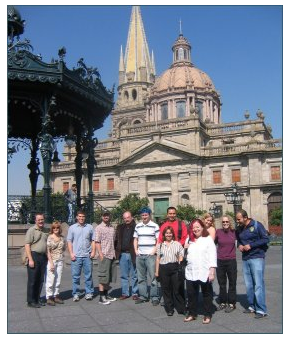I was a mess in Spanish class yesterday. It has really gotten hard.
Something happened as if a blender went on in my brain and all the separate tenses, their conjugations and irregulars all were mixed up into a Spanish smoothie. I can’t even tell you how upset I was.
We are in a difficult place as far as learning goes, and our teacher tells us that he’s pushing us, which is usually good for me. But sheesh, I have to figure out a way to move forward – and without further meltdowns, too.
The sentences we use in class are answers to questions in our homework. We take the sentences and each student in turn changes it based on our teacher’s prompting – for example, he will say “Paul hopes that….and then you have to change the verbs in the remainder of the sentence into the subjunctive. And then if the first part of the sentence is in the present and the second part is in the past then you need a different subjunctive that uses the haya construction. As you can tell my head is just spinning.
The future and future conditional are floating around there too, just lying in wait so they can trip me up, I think.
So, before class on Friday I am going to review our homework from the last month or two and try to make myself better “cheat-sheets” for all the tenses. I haven’t even felt like I’ve got the preterite and the imperfect all that solid yet.
So, anyone have any tricks for how to overcome brain freeze at this point in my Spanish lessons? I am determined to learn and get through this tough patch but I would like to do it without tears in the future.





Jackie
June 18, 2008I feel your pain. A few years ago I was taking private Spanish lessons with a couple of women I work with. Near the end of the third set of lessons I asked if we could just do some conversational Spanish as that was what we needed to be travelers to Mexico. If I were living in Mexico I would make another attempt at really learning the language. The older I get the harder it is. If I just would have used the Spanish I learned in my three years in high school I probably would by now be fluent.
jennifer
June 18, 2008Oh, Nancy, my heart goes out to you. How about a little laughter therapy? We can go to the market and you can listen to me speak Spanish. Trust me, you will feel waaaay better about your progress 😉
CancunCanuck
June 18, 2008Nancy, I feel your pain, as both a learner and a teacher. This is not uncommon! Take a deep breath and step back from it for a moment. Read something in Spanish for pleasure only without thinking about the tenses, just let it wash over you. Find a magazine or a website in Spanish about something you love and just enjoy the words and the content. When you are feeling ok about it, go back to the same article and start looking at the sentences grammatically and consciously thinking about the verb tenses they are using. Just an idea of course! You’ve got to forgive yourself your mistakes and pat yourself on the back for every victory, confidence is half the battle in learning a language. Good luck, I envy you your classes and teacher, I wish I wasn’t teaching myself, when I get frustrated I often just walk away from it and kick myself rather than congratulating myself for how far I have come. Sometimes it’s hard to take your own advice, you know?
Beth
June 18, 2008There are tons of language/verb excercises available on the internet. When I first went by to university, I thought my french was still pretty good after being out of school for 20 yrs. I quickly figures out that my french grammar was in terrible shape!! I went online and searched for online french grammar excercises and found a bunch. I’m sure there must be spanish versions of the same sort of thing.
The other thing I did, which wasn’t a lot of fun at all, was to pick verbs (I think I had a list of about 100 different verbs), and write them out in each verb tense, over and over and over. Not the most exciting thing to do, but effective. Once you’ve done it for awhile, you start to see how the conjugation looks for each tense, and conjugating the vers gets easier and easier!
Whatever you do though, don’t get frustrated. Take a break, and read for pleasure. Let your mind absorb the way things are written and then verb tenses.
Remember that learning should be fun!
Jonna
June 18, 2008Well, I’m impressed with you Nancy. I am still using my zen outlook in 90% of my conversations… only live in the present tense! I understand other tenses but rarely use them. I’ve got to get past this. I think Cancun Canuck has the right answer though. I buy the gossip mags with lots of pictures of the rich and famous and read those, it has helped with both my reading comprehension and conversation. They are written more like people talk I think.
mcm
June 18, 2008Nancy — I agree that it sounds as though you are beating yourself up way too much! But, I admire your energy and perseverance.
I’m interested in local and national news — from politics to crime — and I read the newspaper daily. I agree with all of those who suggest that you spend some time reading things that are of interest to you — reading let’s you absorb at a pace that you control, unlike speaking (especially in a pressured classroom situation).
Cramming may get you through class, but daily exposure it what makes things stick.
Frankly, hanging around with other expats who are comparing their progress in Spanish and discussing verb tenses is very depressing and discouraging — I avoid it!
Nancy
June 18, 2008Thanks everyone, for your encouraging words. I really had a bad day yesterday, but today I am doing much better.
I have spent the last couple of hours at the computer on
http://www.elearnspanishlanguage.com/grammar/verbs/compoundtenses.html
and making sure that I really understand how all the tenses kind of relate to each other.
My main problem in class is it all goes so fast! You need to read a sentence, and then make the changes on the fly. If I have time I can do it every time, but on the fly is hard.
Here’s an example:
The original sentence is “Ayer vi en la calle a la senora Jimenez.”
Teacher said “Change the sentence to start with “Paul does not believe that…” and I am supposed to come up with “Paul no cree que ayer, yo haya visto en la calle a la senora Jimenez.” That’s when I lost it.
I know I will get it eventually, and I have only been taking classes since mid January so I guess I’m going to try not to beat myself up too much!
Some of your suggestions I already do – read the paper every day, for example. I have bought comic books – recommended by our teacher – but haven’t really read them yet. I also am looking for a Hardy Boy/Nancy Drew kind of book in Spanish thinking that it would be simple enough and also hold my interest a bit. But my problem really isn’t comprehension or reading, it is the shifting tenses etc on the fly.
I’ll do another post in a week or two and report on how it is going, but thanks for your support!
Cynthia Jones
June 18, 2008Hi Nancy!
Just take your time! My husband is learning too and it’s very hard for him to get it! As you know I speak spanish and even for me it’s hard to explain it!!! So just take your time and enjoy it! It will take some time for you to get used to all the new words …
Good luck!
Todd
June 19, 2008Live in the now!
Present tense all the way!
Todd
1st Mate
June 19, 2008Nancy – Recreational reading is a good idea. I’ve begun reading Spanish blogs, which are numerous on the Web and very revealing about the inner life of Mexican people.
Don’t forget, you’re adapting to the summer heat too, and even if your classroom is air conditioning your system (including the brain) is having to slow down 24/7.
mexpat
June 25, 2008Nancy- I know exactly how you feel. I remember crying because I just never thought I would be fluent. I’m still not fluent, but now I’m not afraid to use the Spanish I have.
Keep in mind that you’re already working on pretty complex grammar! I’m impressed that you’ve gotten so far in as little time as you’ve been at it! And besides- I don’t think I ever use that tense- I use “Si hubiera hecho X, habria tenido X” structure much more (don’t know what that’s called in grammar speak, though) and it’s easier- if it starts with “hubiera” it has to finish with “habria.” For what that’s worth…